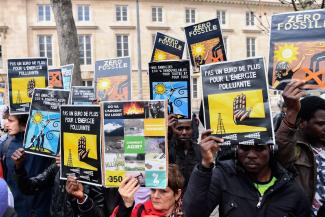Private-sector banks
No money for coal

In order to limit global warming to 1.5 degrees Celsius, as stipulated by the Paris climate agreement, no additional coal, oil or gas deposits can be exploited. That’s because burning the fossil fuels that have already been extracted will exceed the remaining carbon budget. This information comes from the 2018 special report on the 1.5-degree goal by the Intergovernmental Panel on Climate Change (see Lea Diehl and Sabine Balk in D+C/E+Z e-Paper 2018/12, Monitor section).
The study “Banking on climate change 2020”, which examines the influence of private-sector banks on climate change, therefore draws the conclusion that no new fossil-fuel projects should be financed. Nevertheless, this continues to happen on a grand scale: the 35 banks under review, from Canada, China, Europe, Japan and the USA, have reportedly funnelled a total of $ 2.7 billion into fossil fuels in the four years since the adoption of the Paris agreement (from 2016 to 2019). According to the study, more money is spent each year than in the year before. Most of it comes from the US banks JPMorgan Chase, Wells Fargo, Citi and Bank of America. The Canadian bank RBC landed in fifth place. Barclays was the top fossil bank in Europe, MUFG in Japan and the Bank of China in China.
The authors do see signs of progress, however. Of the 35 banks the study examined, 26 now have policies restricting coal financing, and 16 also restrict financing to certain sectors of the oil and gas industries. According to the authors, this is not surprising – after all, the global financial system is always concerned with risk and return. “And no risk to the profits of individual companies and the financial system as a whole is greater than that posed by the climate crisis.” On top of the financial risk, banks must also consider their reputations: more and more customers and employees do not want to take part in financing the destruction of the earth.
Policies restricting fossil-fuel financing are, according to the study, a basic prerequisite, but so far they have been much too weak. The French bank BNP Paribas is a case in point: it has adopted some of the strictest guidelines of all the banks covered in the study, but it nevertheless doubled its coal financing over the past year. Although, on the whole, coal financing around the world is slowly receding, it is more than compensated for by the increased financing of the oil and gas industries.
Ultimately the report demonstrates that the private banking sector has behaved with “extreme irresponsibility” in relation to the climate crisis. The authors believe that the growing pressure that is also coming from movements like Fridays for Future could mean that the peak of finance flows to the fossil-fuel industry might soon be reached. They emphasise, however, that stagnating at a high level or a slow retreat will not be sufficient; what is needed instead is a rapid and sustained decline in financing in order to reach the 1.5-degree goal. The authors call on banks to:
- explicitly acknowledge the role of the fossil-fuel industry as the main driver of climate change as well as the role of banks in financing this sector,
- halt all financing for new fossil-fuel projects and for companies that are expanding fossil-fuel extraction and the corresponding infrastructure (such as plants and pipelines),
- phase out financing for existing fossil-fuel and infrastructure projects on an explicit timeline that is aligned with the 1.5-degree-Celsius goal,
- phase out financing for projects and companies that extract oil from tar sands, extract oil or gas in the Arctic, offshore or through fracking, manufacture liquefied natural gas, mine coal, or produce coal power, and
- fully respect all human rights, particularly the rights of indigenous peoples, including their water and land rights and their right to free, prior, and informed consent, and prohibit all financing for projects and companies that abuse these rights.
Link
Rainforest Action Network, 2020: Banking on climate change. Fossil fuel finance report 2020.
https://www.ran.org/wp-content/uploads/2020/03/Banking_on_Climate_Change__2020_vF.pdf
Katja Dombrowski is member of the editorial team of D+C Development and Cooperation / E+Z Entwicklung und Zusammenarbeit.
euz.editor@dandc.eu










